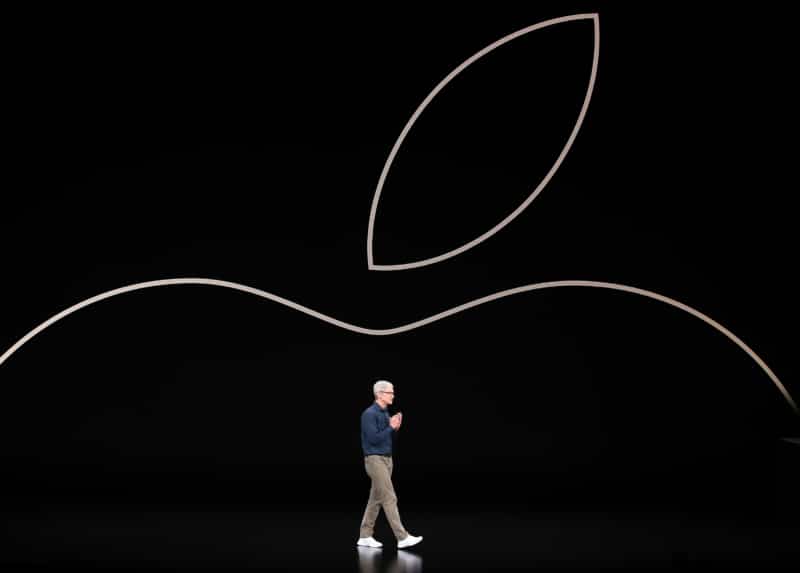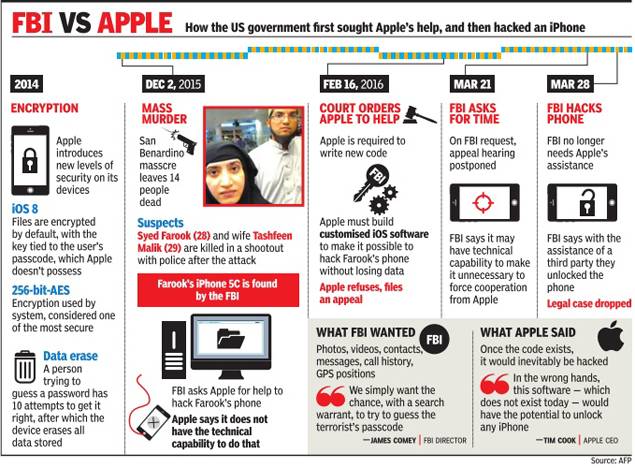
APPLE – FBI BATTLE
By Pooja Chauhan in Technology
We still don’t know what made Apple change their minds and decide to actually design a system that made them not able to aid the police. Apple is actually providing aid to the kidnappers, robbers and murderers who have actually been recorded on the telephones in Riker’s Island telling their compatriots on the outside.
You gotta get iOS 8. It’s a gift from God, — and that’s a quote — because the cops can’t crack it.
New York’s leading law enforcement authorities have condemned the tech giant for refusing to unlock its iPhones for law enforcement. The company even refused to open up an iPhone used by one of the San Bernardino shooters in the Dec. 14 mass shooting.
“Right now Cy Vance, the Manhattan district attorney, has 175 iPhones stacked up in his office that are subject to search warrants, issued by judges, involved in crimes,” Miller fumed. Behind every search warrant, there’s a crime, behind every crime is a victim. Manhattan DA Vance has said Apple’s policy is making cyberspace into a paradise for criminals.
Two weeks ago, the FBI called Apple’s headquarters in Cupertino, California, with a jarring message: the agency wanted Apple to help them hack an iPhone. Apple refused. The request stepped up a level on 16 February when a federal magistrate ordered Apple to help the FBI unlock a single iPhone – the phone belonging to one of the killers in the December mass shooting in San Bernardino, California. Apple again refused.
But this carefully planned legal battle has been months in the making, US officials and tech executives told the Guardian, as the government and Apple try to settle whether national security can dictate how Silicon Valley writes computer code. Apple chose to protect a dead Isis terrorist’s privacy over the security of the American people
Both sides expect the ensuing legal battle to have far-reaching implications that will touch on encryption, law enforcement, digital privacy and a 227-year-old law from America’s post-colonial days.
“The law operates on precedent, so the fundamental question here isn’t whether the FBI gets access to this particular phone,” said Julian Sanchez, a surveillance law expert at the libertarian-leaning Cato Institute in Washington. “It’s whether a catch-all law from 1789 can be used to effectively conscript technology companies into producing hacking tools and spyware for the government.”
Apple and the government, observers and people close to the case said, want to set a legal precedent about where digital security ends and national security begins after nearly two years of hearings, open letters and Washington-Silicon Valley shadowboxing. Speculation has already begun about how far both sides are willing to go in appealing unfavorable rulings.
The politics are tricky. Apple is popular and code is protected by America’s free-speech law. Privacy advocates planned to gather at Apple stores across the US in support of the iPhone maker.
Apple CEO Tim Cook said in a impassioned statement: “We have no sympathy for terrorists. But now the US government has asked us for something we simply do not have, and something we consider too dangerous to create. They have asked us to build a backdoor to the iPhone.”
Apple introduced enhanced encryption in 2014. Apple’s actions in this case require some context. In September 2014, Apple introduced new encryption into its iPhone operating system that would make it mathematically impossible for the company to unlock them for investigators. This was a departure from the past, when investigators could get access to a device if they sent it to Apple headquarters with a search warrant.
The shift was in response to increased digital privacy concerns and distrust of America’s digital spies following revelations from former National Security Agency contractor Edward Snowden.
Since then, FBI director James Comey has been trying to figure out a way around the software as he and Apple’s Cook have traded barbs publicly and privately. Comey hit a snag, however: the Obama administration didn’t want to pick a fight with one of America’s most popular – and valuable – companies.
In October 2015, the director abandoned his push for legislation that would require Silicon Valley to maintain some sort of way to unlock smartphones and inboxes for investigators. Since then, the Obama administration has sounded notes of cooperation, sending officials to Silicon Valley for what they billed as an air-clearing discussion. Comey’s later rounds of rhetoric focused on mutual interests in safety and privacy felt in Washington hearing rooms and Palo Alto boardrooms.


Leave a Comment
You must be logged in to post a comment.